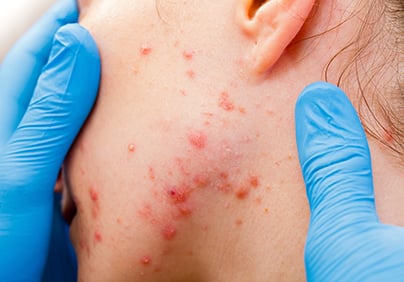Recipes
Acne is a common disease of the skin involving the pores, typically affecting the face, chest, and back. Acne can range from inflammatory to non-inflammatory, acute to chronic, and mild to severe. It may present as comedones, cysts, papules, or pustules. In severe chronic cases, it may lead to scarring of the skin.

Acne is most common in adolescents, but may occur in adults alike and is very common in general. Most individuals will develop at least mild acne during adolescence, but what many don’t realize is that up to approximately 50% of adults (mostly women) in their 20’s (and 35% in their 30’s) will suffer from acne, and it can occur even in those older than 40 years old.1 Factors that influence acne include:
Until more recently, the general medical community did not consider acne to be caused by dietary factors. Now, as suspected, we have proof of a connection, particularly with dairy and processed foods with a high glycemic load. Interestingly, the prevalence of adult acne has been increasing over the years, likely due to poor diet. A Nutritarian eating style can be the primary strategy to resolve acne and keep it from coming back.
Follow a Nutritarian eating style for the maximum intake of nutrients that help maintain clear, healthy, radiant skin (carotenoids, omega-3 fatty acids, antioxidants, etc.).
Avoid dairy (milk, yogurt, cheese, whey protein, casein protein, etc.), which has been associated with a higher risk of acne, which may be due to factors that include dairy’s influence on insulin and insulin growth factor 1 (IGF-1), which is known to aggravate acne.
Strive for a lower glycemic load at your meals. Foods with a high glycemic load to reduce/eliminate include:
Plant foods that have a relatively low glycemic load include:
Take advantage of ways to reduce mental, emotional, and physical stress by getting enough quality sleep, exercising, and including healthy social interaction, to name a few.
ONLINE: All members of DrFuhrman.com can search the Ask the Doctor archives for discussions on this topic. Platinum and Diamond members can connect with Dr. Fuhrman by posting questions in the forum. Not a member? Join now.
IN PERSON: Book a stay at Dr. Fuhrman’s Eat to Live Retreat in Southern California. With options ranging from one, two and three months (and sometimes longer) you will be under Dr. Fuhrman’s direct medical supervision as you hit the “reset” button on your health. For more information: (949) 432-6295 or info@ETLRetreat.com.
EVENTS: Join Dr. Fuhrman for an online boot camp, detox or other event. During these immersive online events, you’ll attend zoom lectures, follow a special meal plan, and have access to a special, live Q&A session with Dr. Fuhrman. Learn more about events.
The following are sample questions from the Ask the Doctor Community Platinum and higher members can post their health questions directly to Dr. Fuhrman. (All members can browse questions and answers.)
I have adult acne, which has progressively gotten worse. Can you please suggest a healthier alternative to antibiotics?
Acne almost always clears with vigilance to a Nutritarian diet, which is rich in phytonutrients and fiber. Using the supplements I recommend, including omega-3 fats and some extra zinc, can also be helpful. Richly colored fruits and vegetables, which are high in micronutrients, including carotenoids, reduce acne formation. This means eliminating all sugar, processed foods, oils, trans-fats, and dairy. Also, for the next few weeks, it maybe be helpful to restrict grains. These all provide a favorable environment for acne to flourish. Eat 1-2 oz. of nuts and seeds daily. Make sure you are getting adequate zinc, as zinc deficiency is associated with acne. Women’s Daily Formula provides 15mg of zinc/day. Adding DHA, vitamin D, and a high quality probiotic will also be beneficial. I think you should see marked improvement in 4 to 8 weeks.

Along with losing 26 pounds, Chris's acne cleared up and he is in the best shape of his life... Read More
Results may vary.

Results may vary.
Brandy lost 18 pounds and won her five year battle with depression, no longer has acne, and is happier and more energetic than ever before... Read More
Results may vary.